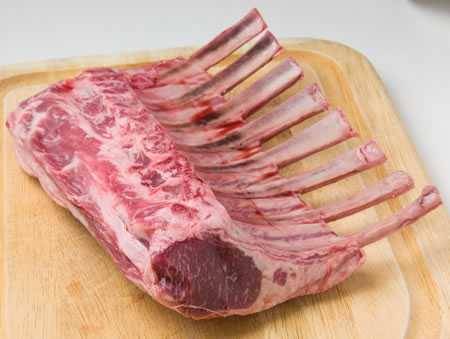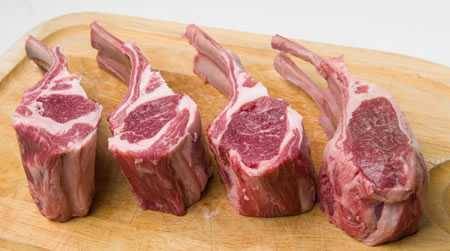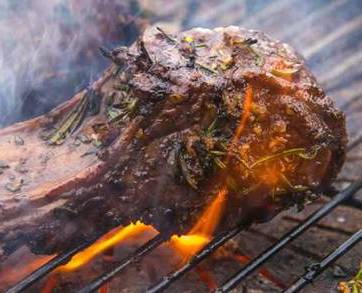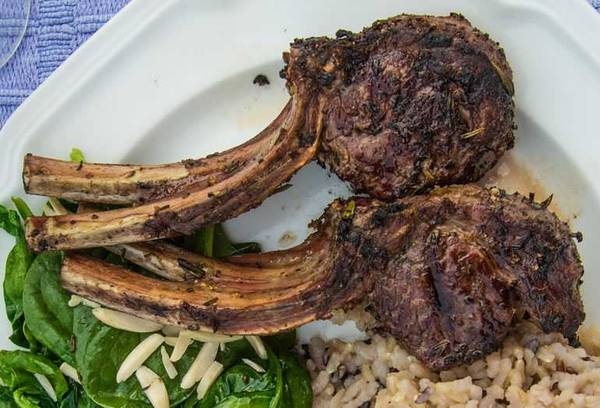Wham bam thank you lamb!
Rack of lamb is a classic fancy restaurant meal and some of my favorite meat in the world. At $20 or so per pound, it better be good.
The rack is the same cut as a beef prime rib, the longissimus dorsi, and the meat is the equivalent of the beef ribeye. But it is a lot smaller, usually somewhere about 3 pounds (1.3kg) for a whole rack of eight bones before trimming. After you trim it and cook it you have just enough for two, about 20 ounces (566g) with bones. Remove the bones so there is just an amazing ribeye and you have about 12 ounces (340g), again, dinner for two.

Three methods
You can cook the rack whole, you can make Lollipops, or you can make Ribeye Steaks. All three methods make an impressive presentation.
No matter which method, you need to remove the thick exterior fat layer and any silverskin underneath. The fat adds little flavor and prevents the meat from browning. Contrary to myth, fat caps do not improve flavor. Read this article on the subject of fat caps. Not only that, but lamb fat is not as tasty as beef or pork fat.
Makes:
Takes:
Ingredients
- 4 cloves garlic
- 3 tablespoons finely chopped fresh rosemary or 2 teaspoons dried
- ½ teaspoon coarsely ground black pepper
- 3 tablespoons water
- 1 rack of lamb about 8 bones and 3 pounds (1.3kg) per rack before trimming
- Coarse salt to taste
These recipes were created in US Customary measurements and the conversion to metric is being done by calculations. They should be accurate, but it is possible there could be an error. If you find one, please let us know in the comments at the bottom of the page
Method
Grilled Lamb Lollipops
- Prep. Mince, press, or crush the garlic and mix it with the rosemary, pepper, and water. Let the mixture sit for at least an hour so the water can extract the flavors. This is called a wet rub. Notice there is no salt. I like to salt it at the table with large grain salt that pops in my mouth.
- Trim off all the fat cap from the lamb and as much of the fat near the bone as possible. This is called Frenching. There is often a tough silverskin membrane beneath the fat cap that needs to go, too. Yes, this is a lot of waste from a cut that was expensive to begin with. Work carefully so you don't waste any of this expensive meat. To completely French the bones, remove all the meat between the bones so the bone is bare and showy. Or, leave that little sliver of meat between the bones. It usually overcooks but is pretty tasty. Your call.
- After trimming, I like to take one more step to increase the marvelous Maillard and caramelization flavors of a brown surface. I cut the rack into four sections, each two bones wide. These are called lollipops because the knob of meat, perhaps 2" (5cm) diameter and 1.5" (3.8cm) thick, can easily be eaten without the aid of knife and fork in about six bites. Yes, you could cut the rack into single bone sections, but then you're left with lollipops that are so thin that they overcook inside before getting properly browned on the outside. For an 8-bone rack, I prefer to cut the rack into four fat chops by slicing between every second bone. Try to make them the same thickness so the will cook at the same rate.

- Apply the wet rub. Use a lot. Much of it will fall off during cooking. You can let it marinate for a while, but it really won’t penetrate much. One to three hours is enough.
- Fire up. Preheat the grill for 2-zone cooking with the direct heat side at Warp 10.
- Cook. Warm the meat gently on the indirect side with the lid down until it hits about 125°F (52°C). Then move the chops over the direct side to sear the exterior. Leave the lid open and place the bones over the edge away from the heat so they don't burn. This technique of warming the meat before grilling over direct heat is called reverse sear and it insures the most even colored interior possible. When you turn the meat try not to drag it across the grates and scrape off the rub, but turn often, about every 2 minutes. Take it up to 130°F or 135°F (54 to 57°C) for medium rare (rosy color) or 140°F (60°C) for medium (pink).

- Serve. Usually I want you to salt meat long before you cook (dry brining), but this small cut is best if you save a coarse salt for the end, just after serving, like granules on a pretzel. Go easy, it won't need much.
Lamb Ribeye Steaks
- Here's an alternative way to prepare the rack. Trim the fat as described above, but completely remove the meat from the ribs, cutting as close to the bones as possible. You'll be left with a 12 to 14 ounce (346 to 397mg) tube of lamb ribeye meat similar in size to a pork tenderloin. Apply the wet rub and marinate in the fridge for 1 to 3 hours, then grill the whole lamb ribeye right alongside the ribs as described above. Slice the meat into medallions (steaks), and serve them with the bones on the side. Great fun! Check out the video "A Better Way To Prepare Rack Of Lamb" above to see how it's done.
Whole Rack Of Lamb
- Finally, the traditional method is to roast or grill the whole rack of lamb with the fat trimmed and bones Frenched as described above. Many recipes call for coating the meat with mustard and breadcrumbs. But that covers the meat and then you're browning the mustard and breadcrumbs instead of browning the meat. I prefer the flavor of browned meat. I just rub the Frenched rack with Dolly's Lamb Rub And Past, grill it over high heat, and sprinkle it with large grain seasoned salt at the table.




High quality websites are expensive to run. If you help us, we’ll pay you back bigtime with an ad-free experience and a lot of freebies!
Millions come to AmazingRibs.com every month for high quality tested recipes, tips on technique, science, mythbusting, product reviews, and inspiration. But it is expensive to run a website with more than 2,000 pages and we don’t have a big corporate partner to subsidize us.
Our most important source of sustenance is people who join our Pitmaster Club. But please don’t think of it as a donation. Members get MANY great benefits. We block all third-party ads, we give members free ebooks, magazines, interviews, webinars, more recipes, a monthly sweepstakes with prizes worth up to $2,000, discounts on products, and best of all a community of like-minded cooks free of flame wars. Click below to see all the benefits, take a free 30 day trial, and help keep this site alive.
Post comments and questions below
1) Please try the search box at the top of every page before you ask for help.
2) Try to post your question to the appropriate page.
3) Tell us everything we need to know to help such as the type of cooker and thermometer. Dial thermometers are often off by as much as 50°F so if you are not using a good digital thermometer we probably can’t help you with time and temp questions. Please read this article about thermometers.
4) If you are a member of the Pitmaster Club, your comments login is probably different.
5) Posts with links in them may not appear immediately.
Moderators